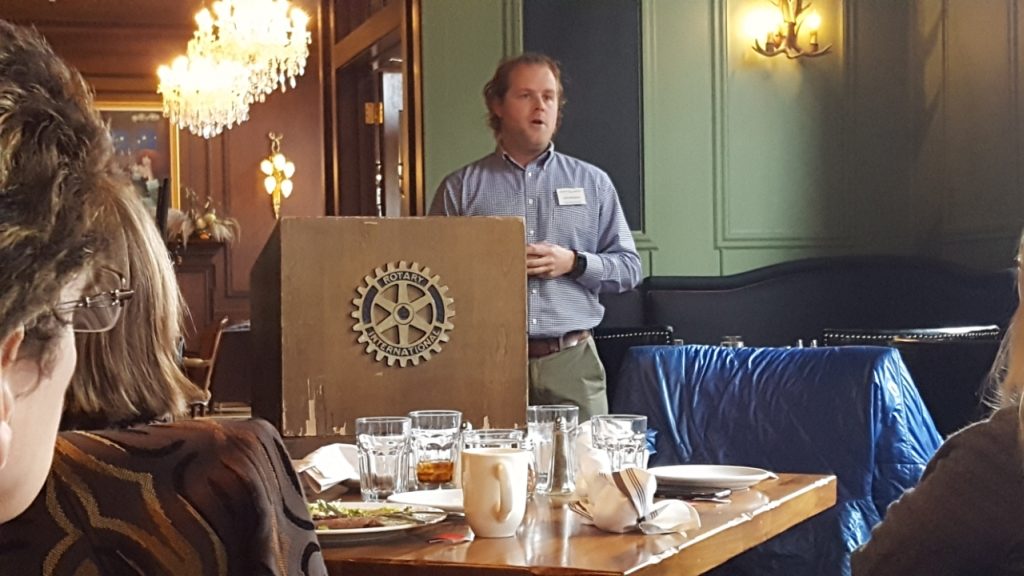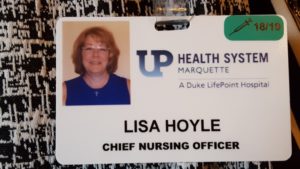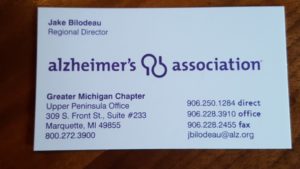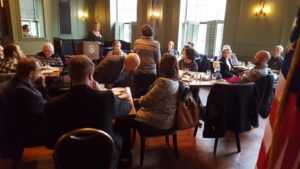Marquette, MI – November 7, 2018 – Convening for another weekly Marquette West Rotary Luncheon, Rotarians were joined by Lisa Hoyle, Chief Nursing Officer of UP Health System and Alzheimer’s Assocation Regional Director Jake Bilodeau.
Today’s main speak, Jake Bilodeau attended Northern Michigan University in 2006 and now oversees the Greater Michigan Chapter made up of 15 counties. The Marquette office serves the 2nd largest territory in state and the Association is the leading voluntary health organization in Alzheimer’s care, support and research.

During Bilodeau’s presentation he helped Rotarians understand the difference been simply Dementia and simply aging.
Common Facts:
- I forgot my keys or forgot my appointment
- This is not an example of dementia. We all age and this is normal for us. Dementia involves short term memory loss and confusion, but not a reaction to medication.
- Most common form of dementia is Alzheimer’s Disease. We can’t cure it or slow it down as of this date.
- Early detection of Alzheimer’s is important because there are plans that can be made to help when diagnosed early.
- 180,000 people in Michigan have Alzheimer’s Disease and 500,000 caregivers take care of them.

Bilodeau is a former NMU Grad and started in Marquette. - In the Upper Peninsula we have 9,000 residents who live with Alzheimer’s.
Bilodeau stated, “One of the biggest needs is information. People need someone to talk too about this disease.” Care givers are an important part to dealing with Alzheimer’s and we have an incredible support system right here in the Upper Peninsula. There are 10 active support groups for care givers in the U.P. On average a facilitator meets with 8 to 10 folks to discuss their challenges.
It’s also important to know the signs of Alzheimer’s so you can help spot the disease and support people you know. Early stage people still function mostly normal. They can do every day tasks like driving and exercising with makes it hard to recognize the signs.
10 Early Signs and Symptoms:
- Memory loss that disrupts daily life
- Challenges in planning or solving problems
- Difficulty completing familiar tasks at home, work or at leisure
- Confusion with time or place
- Trouble understanding visual images and spatial relationships
- New problems with words in speaking or writing
- Misplacing things and losing the ability to retrace steps
- Decreased or poor judgement
- Withdrawal from work or social activities
- Changes in mood or personality
As the disease continues, people in the middle stages of Alzheimer’s often talk less and might not eat. Later stages of the disease require round the clock care for the patient as they loose the ability to eat or swallow.

Jake Bilodeau addressed 4 other areas related to the disease: Nutrition, Exercise, Social Engagements out from the house, and Cognitive Activity to keeping the brain going. Marie Ross from the Greater Michigan Chapter office in Marquette works is a social worker who works locally to help patients with their memory loss.
What can we do?
After covering what we can do to help recognize symptoms in family members or friends, Jake Bilodeau talked about what we can do to help overall. Medications for Alzheimer’s and research on the disease exists, but the form of dementia continues to be incurable. We need to find ways to fund research. Anyone can become an Alzheimer’s advocate by doing small things like sending a letter to Jack Bergman and others asking for dollars. Held annual in more than 600 communities nationwide, the Alzheimer’s Association Walk to End Alzheimer’s® is also a great way to fund research and cover the costs of patient care. 77% of funds raised during the walk go toward Alzheimer’s care, support, research, awareness, and advocacy.
For more information:
Contact Jake Bilodeau at the Great Michigan Chapter Upper Peninsula Office at 309 South Front Street, Suite #233 in Marquette, Michigan. You can call at (906) 22-3910. Want to contact online? Email jbilodeau@alz.org or fill out the website’s online form.
By the way, Jake Bilodeau has requested to join the Marquette West Rotary Club and should be inducted soon!








